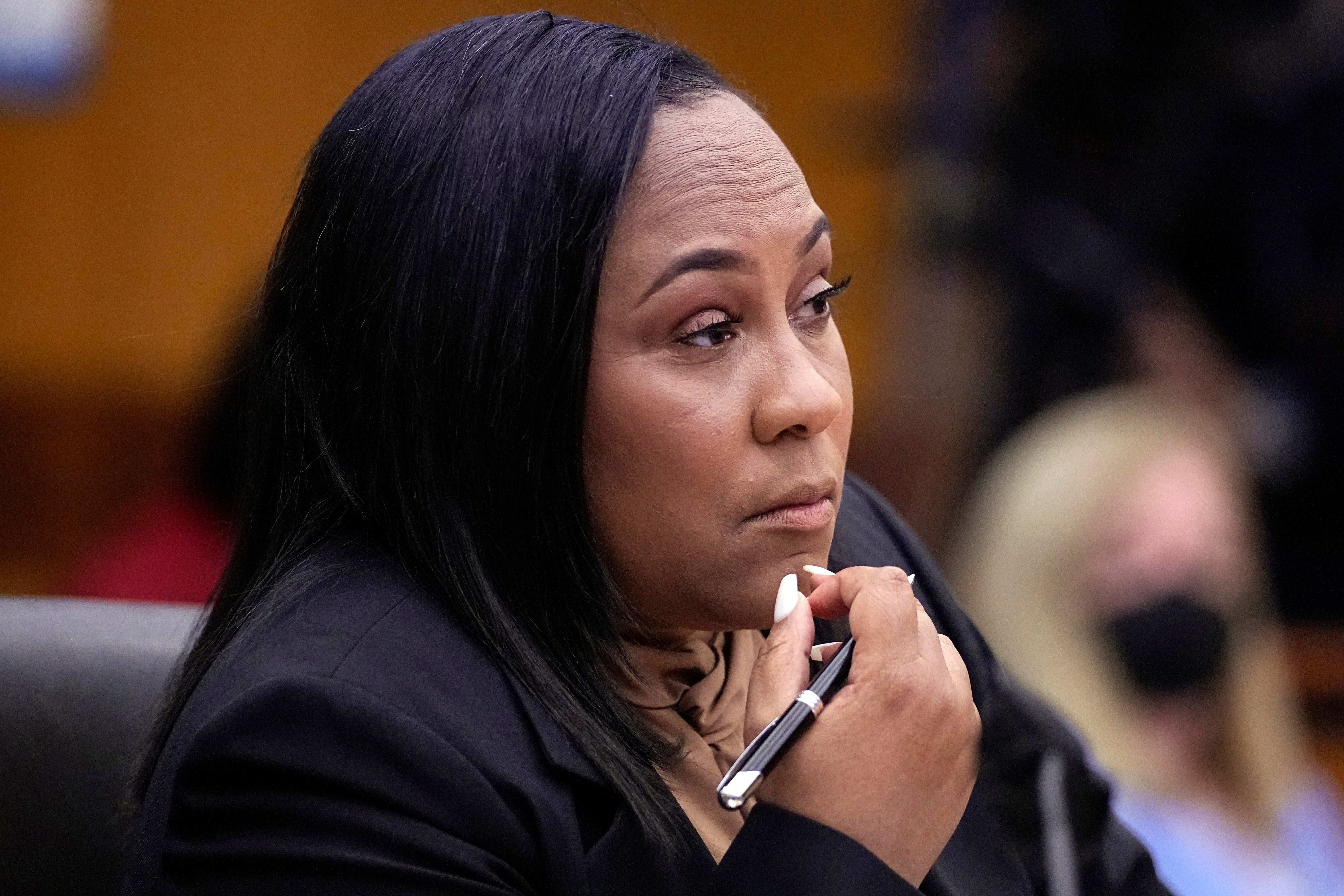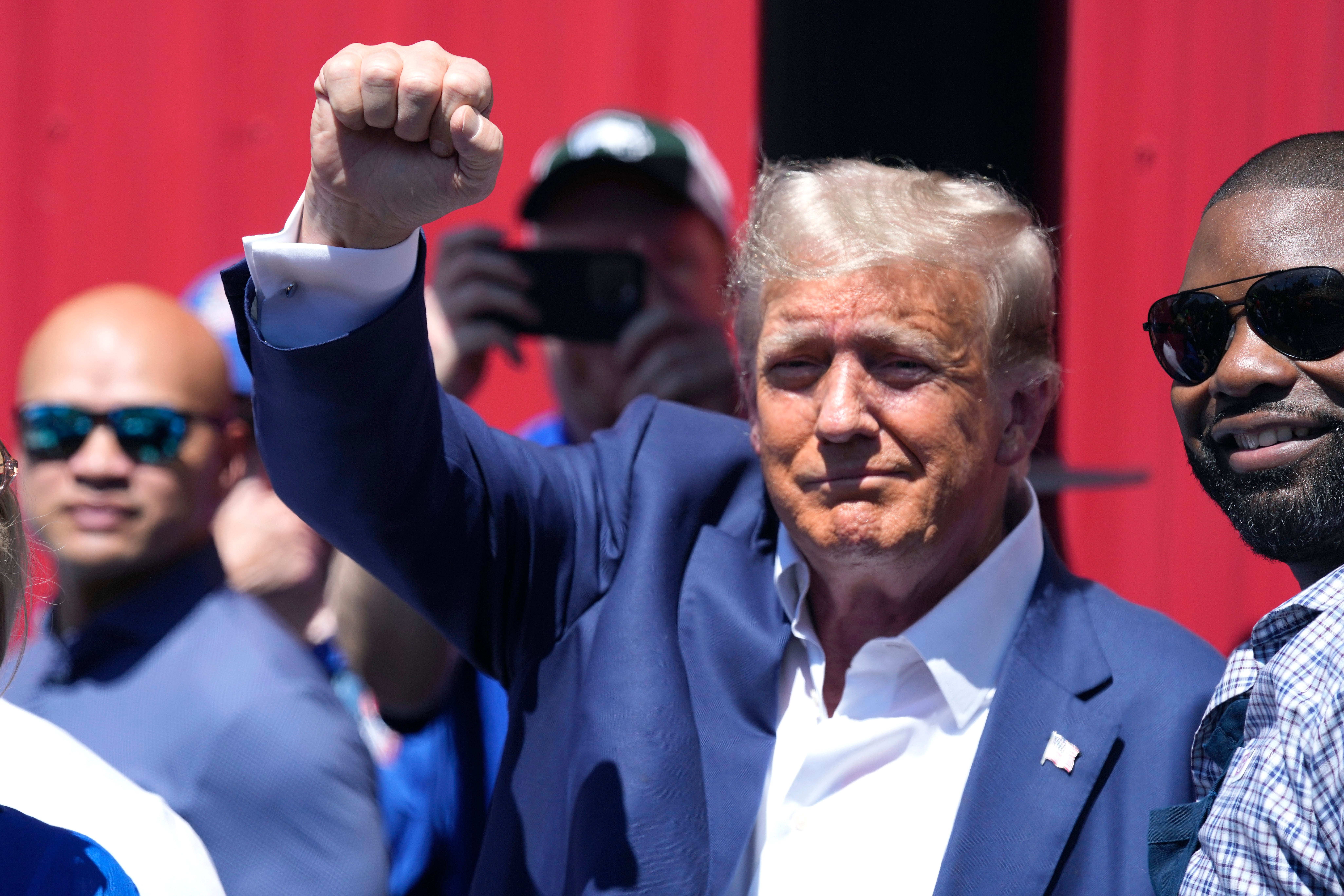‘This is business, it will never be personal’: Georgia DA readying Donald Trump’s fourth indictment
Meticulous Fulton County district attorney Fani Willis has spent more than two years investigating former president’s election-meddling in her state, writes Joe Sommerlad


Donald Trump is expected to receive his fourth criminal indictment any day now when Fani Willis, district attorney of Fulton County, Georgia, formally charges him over his efforts to overturn the 2020 election result in the Peach State.
The first US president ever to be impeached twice also became the first to be charged with a crime in April when Manhattan district attorney Alvin Bragg charged him in New York City over accusations he falsified business records in order to conceal a hush money payment made to porn star Stormy Daniels in 2016 in order to prevent her discussing their extramarital affair a decade earlier, which might have derailed his bid for the White House had she been at liberty to speak out.
Since then, Justice Department special counsel Jack Smith has indicted him twice more: once in June over his alleged mishandling of classified documents belonging to the US government post-presidency – boxes of which were found stacked in a guest bathroom and ballroom at his Mar-a-Lago mansion in Florida during an FBI raid – and again in August over his alleged efforts to steal the election and the resulting attack on the US Capitol by his supporters on 6 January 2021.
In all three cases, Mr Trump pleaded not guilty to all charges and he is expected to do the same should he face a fresh set of accusations from Ms Willis.
As with Mr Bragg and Mr Smith, the former president has braced for this latest disgrace by attempting to smear and discredit the prosecutor, baselessly telling his supporters at a rally in Windham, New Hampshire, earlier this month that Ms Willis is “a young racist” who previously had an affair with one of her clients, a rapper named YSL Mondo targeted in a racketeering probe, even making the claim the basis of an attack ad running in Atlanta and other cities.
Ms Willis has, wisely, instructed her staff to ignore these “derogatory and false” claims, for which there appears to be no basis beyond a Rolling Stone magazine account of that case, which contains no trace of any such allegation.
“You may not comment in any way on the ad or any of the negativity that may be expressed against me, your colleagues, this office in coming days, weeks or months,” she wrote in a memo.
“We have no personal feelings against those we investigate or prosecute and we should not express any. This is business, it will never be personal.”
Mr Trump’s attorneys have also attempted to have Ms Willis disqualified from participating in investigations against their client and have the evidence her office has compiled disregarded, only for their lawsuit to be cheerily tossed out by a judge in late July.
Mr Trump’s alleged election-meddling in Georgia began in the aftermath of the swing state turning blue for Joe Biden on 3 November 2020, when the Democrat scored a narrow victory for the incumbent president by picking up 2,473,633 ballots or 49.47 per cent of the vote to Mr Trump’s 2,461,854 or 49.24 per cent.
Nationally, Mr Biden won the popular vote by 81,283,501 to 74,223,975 (or 51.3 per cent to 46.8 per cent) and the Electoral College vote by 306 to 232, a comprehensive trouncing by any fair-minded assessment.
Mr Trump, however, was enraged by the defeat and immediately cried foul, insisting the contest had been stolen by a vast, nationwide conspiracy to defraud him, dispatching Rudy Giuliani and other yes-men lawyers from his inner circle to contest the outcome, losing case after case – and no little personal dignity – in one state after another as the Trump camp entirely failed to prove its fanciful narrative.
Mr Smith’s second indictment covers that familiar story and charges the Republican with conspiracy to defraud the United States, conspiracy to obstruct an official proceeding, conspiracy against rights and the obstruction of, and attempt to obstruct, an official proceeding.
Ms Willis’s indictment, when it emerges, is expected to prosecute Mr Trump’s efforts to interfere in Georgia specifically, notably his notorious phone call of 2 January 2021 with its secretary of state Brad Raffensperger, in which he asked the latter to help him “find” the 11,780 votes he needed to overcome Mr Biden’s win.
As was the case in his first impeachment, when he was caught on tape attempting to blackmail Ukrainian president Volodymyr Zelensky, Mr Trump’s call with Mr Raffensperger was recorded. When it was published by The Washington Post, legendary journalist Carl Bernstein pronounced it “worse than Watergate”.
Just one month after the episode came to light, Ms Willis announced she was looking into possible illegal “attempts to influence” the result in her backyard.
Roughly one year into the investigation, the DA took the unusual step of asking for a special grand jury to use its subpoena power to compel testimony from witnesses who otherwise would not be willing to talk to prosecutors.
That jury was seated in May 2022 and concluded its work after hearing from roughly 75 witnesses before dissolving in January this year.
Those compelled to appear and give evidence included former White House chief of staff Mark Meadows, US senator Lindsey Graham and former senator Kelly Loeffler, plus five members of the Trump legal team, including Mr Giuliani, Jenna Ellis and John Eastman, architect of the “fake elector” scheme, among several others.
A partially released report into the jury’s findings revealed that its members unanimously agreed that “no widespread fraud took place” in Georgia’s election following its interviews with election officials, analysis and poll workers.

A new grand jury in Fulton County was sworn in on 11 July under superior court judge Robert McBurney, who oversaw the previous special grand jury, to hear the arguments for prosecution and consider whether or not there is sufficient probable cause to merit an indictment.
Famously particular, patient and methodical, Ms Willis finally told local TV station WXIA late last month: “The work is accomplished. We’ve been working for two and half years. We’re ready to go.”
It is widely expected that she will now use Georgia’s Racketeer Influenced and Corrupt Organisations (RICO) laws to charge not only Mr Trump but also a number of his allies for alleged participation in a wide-ranging conspiracy, perhaps throwing in charges related to influencing witnesses and computer trespass too for good measure.
Georgia’s racketeering statute requires prosecutors to show the existence of an “enterprise” with a pattern predicated on at least two other “qualifying” crimes.
Evidence in the case is unlikely to be revealed until an indictment is unsealed, but a charge involving influencing witnesses could look at the former president’s call with Mr Raffensperger.
For the computer trespass charge, in which prosecutors would need to show that defendants used a computer or network without permission to interfere with a program or data, prosecutors could turn to the breach of voting machines in Coffee County, which occurred when a group of staffers working under the one-time Trump-connected attorney Sidney Powell allegedly copied data from the machines at the county’s election office.
That information from Dominion Voting Systems devices was then uploaded to a password-protected website in a spurious, failed effort to prove that the election had indeed been rigged against Mr Trump.
Some critics have accused Ms Willis of over-using Georgia’s RICO laws in the past and unnecessarily complicating cases that could otherwise be tried in less time with fewer resources, just to get the enhanced penalties those statutes carry.
Gerald Griggs, president of the Georgia NAACP and an Atlanta defence attorney, told the Associated Press he does not always agree with her application of RICO but does believe it is appropriate “if there was a scheme to interfere in the election and numerous actors were involved.”
For now, precisely what she has up her sleeve remains to be seen but Clint Rucker, a fellow former Fulton County prosecutor, says he expects people to be surprised by “the level of preparedness and the level of sophistication of the prosecution”.
“That office is not some small backwoods country hick organisation that fumbles the ball and doesn’t know how to do its job,” he said.
Join our commenting forum
Join thought-provoking conversations, follow other Independent readers and see their replies
Comments


Bookmark popover
Removed from bookmarks